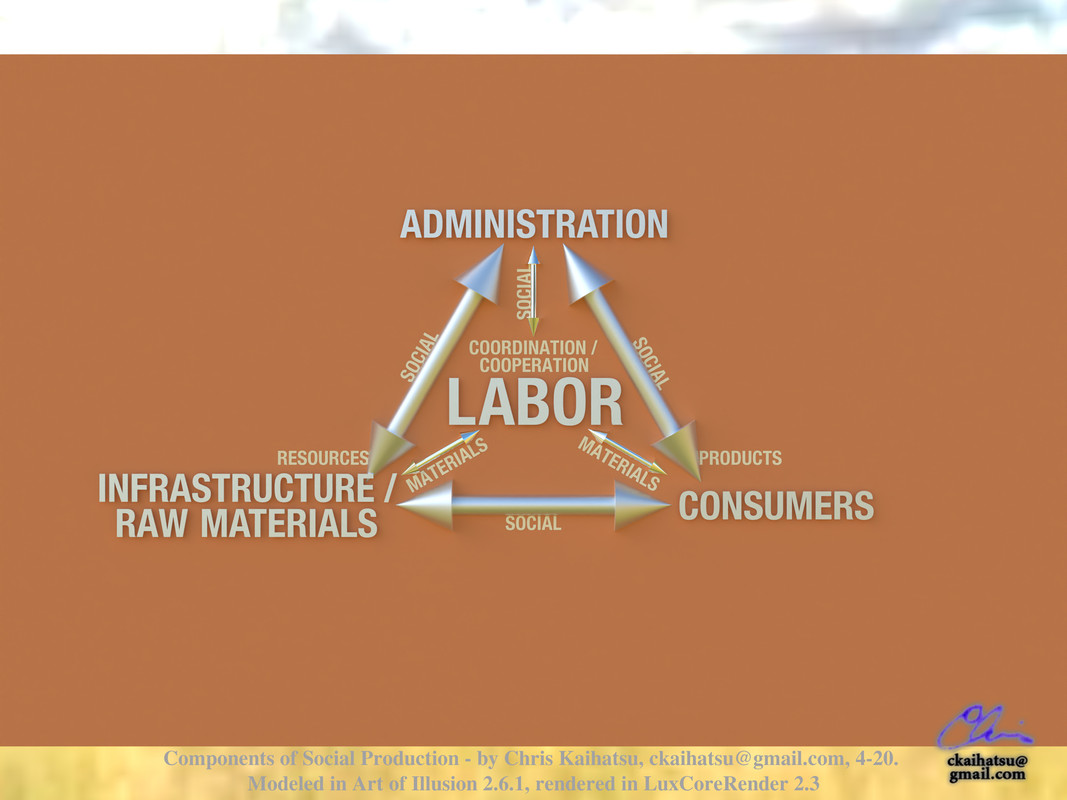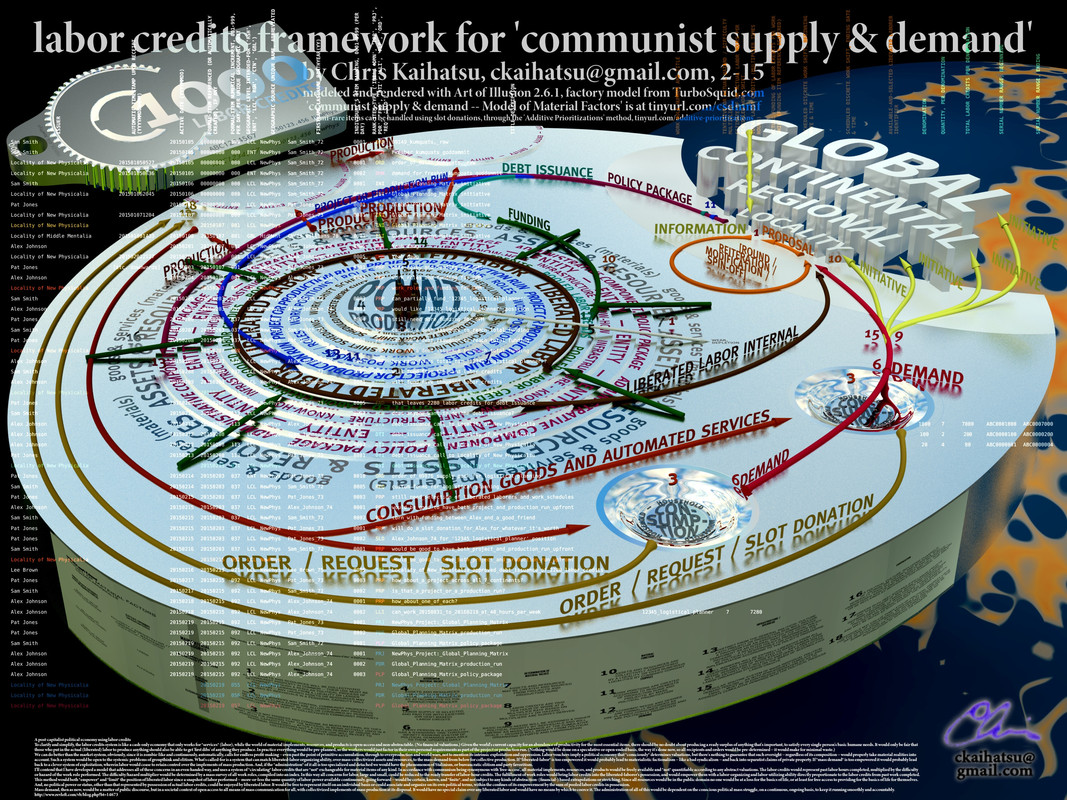- 08 Jun 2021 21:01
#15176287
(Already covered this -- customer must be satisfied with the on-the-ground service, etc.)
---
No, I already pointed out that this is 'gamification', and not actual *material incentives* (wages and benefits) to the worker.
---
Since the beginning of wage labor and wages.
---
---
What model?
And, there's no 'optimization' of finance capital, and financialization -- I just noted that it's a runaway *monster*, always, that inevitably becomes a *Ponzi* scheme. In the past two decades it's been pulling in *government* public funds as well.
---
I would certainly hope so, but I think it's moreso that the *political terrain* has now been stabilized, plus nuclear annihilation wouldn't be worth it, for *any* party / nationalist entity.
Much that's *economic* has also been established, and due to capitalism's declining rate of profit there's less to fuss over, anyway, especially with increased mechanization / computerization / automation.
---
I'll *clarify* -- here's from a recent news article:
---
Okay, then what about for *vacant rental units*, so as to provide *housing* -- ?
---
You're thinking 'UBI', though -- I advocate Universal Basic *Services*, so as to recover from Trump's *austerity* policies (going back several decades / presidencies).
---
They *weren't* turned into profitable companies, though:
---
Okay, so you're *dismissive* of civil rights movements like Black Lives Matter, and any *funding* for such, because such politics is *critical*, politically, which you term 'cancel culture'.
Effectively, *you're* just being dismissive and 'cancel-ing' without even addressing the *issues* raised by civil rights movements like Black Lives Matter -- particularly killer cops and police brutality.
---
If you're interested in this kind of *academic* topic then you can go *research* it, if you like.
---
Oh, you're changing the *scale* of analysis again -- for any given laid-off worker there could always be government *assistance*, as currently, with the pandemic, and you've expressed support for job *training* programs, as well.
But, regarding the whole *system* of capitalism, it's ultimately *unreformable*, and workers would collectively be far better off not having to work for *bosses*, but rather for *themselves*, collectively, worldwide -- hence revolution.
---
This was the bourgeois counterrevolution that *tipped the scales* against revolution in Europe:
---
Feel free to describe your definition of 'productivity'.
---
But then why didn't that just spontaneously happen *sooner* -- ? And why are some places in the world *still* using draft animals, under conditions of relative feudalism *today*?
---
Nominal wages isn't the same as *real* wages, which isn't the same as labor *productivity*.
ckaihatsu wrote:
As already cited, I'd say 'sales' and 'account executive'.
wat0n wrote:
How so? Both are handled through the app.
(Already covered this -- customer must be satisfied with the on-the-ground service, etc.)
---
ckaihatsu wrote:
So then you're tacitly admitting that there *are no* executive-type 'perks' or material 'incentives' offered to the service provider -- the provider of the service commodity.
wat0n wrote:
Higher payments early into the providing the service is not an incentive to you?
No, I already pointed out that this is 'gamification', and not actual *material incentives* (wages and benefits) to the worker.
---
ckaihatsu wrote:
Perhaps, then, you can explain why only the business-*internal* (necessarily white-collar) personnel receive material incentives. Shouldn't the commodity service providers receive the lion's share of the revenue since they're the ones producing the commodities that are sold -- ?
wat0n wrote:
Since when is this the case?
Since the beginning of wage labor and wages.
---
ckaihatsu wrote:
No disagreement -- are you *sure* that there are no cases where an inventor simply went straight-to-market with their creation, and got sales strictly through word-of-mouth -- ?
wat0n wrote:
I wouldn't be surprised if that had happened, particularly before mass media became a thing. However, it's often more profitable to just take the effort to actually market your invention.
---
ckaihatsu wrote:
It's a blurry-line, though -- when there's *so much* that's spread around internally, to the business personnel, that means there's less available for the business itself, and then financialization is necessary to increase the exchange-value-size of the business without expanding its *operations* and *net output* at all, and certainly without *increasing wages*. At *that* rate, pretty soon the production operation takes a back-seat to the *financial vehicle* that it's become (a monster), and so then it's a *Ponzi scheme* moreso than it's a productive enterprise. With government bailouts it's a *zombie corporation*.
https://en.wikipedia.org/wiki/Zombie_company
wat0n wrote:
Of course there is an optimization involved here. It's one reason why formalizing your model is actually useful.
What model?
And, there's no 'optimization' of finance capital, and financialization -- I just noted that it's a runaway *monster*, always, that inevitably becomes a *Ponzi* scheme. In the past two decades it's been pulling in *government* public funds as well.
---
ckaihatsu wrote:
That's how it's been addressed by the world powers in the 20th century -- by *two* world wars, not to mention the preceding *regional* European wars of prior centuries.
wat0n wrote:
And yet the experience from those two world wars is precisely what deters war now.
I would certainly hope so, but I think it's moreso that the *political terrain* has now been stabilized, plus nuclear annihilation wouldn't be worth it, for *any* party / nationalist entity.
Much that's *economic* has also been established, and due to capitalism's declining rate of profit there's less to fuss over, anyway, especially with increased mechanization / computerization / automation.
---
ckaihatsu wrote:
Why isn't *wage labor* being materially incentivized, so that workers are given a *real alternative* to pandemic payments? Where's the incentive?
wat0n wrote:
Because it was hazardous to get people back to work. Things are opening up now though.
I'll *clarify* -- here's from a recent news article:
Workers were tired before the pandemic. Now they're reaching a breaking point.
"These guys are just dumbasses if they actually think that the UI is the problem and not the wage," Matt Mies, an unemployed 28-year-old, told Insider.
He was referring to the dozens of Republican governors who have cited a so-called labor shortage, which they've blamed on the "disincentive" created by an expanded federal unemployment benefit from President Joe Biden's stimulus package. The leaders, who govern nearly half of the 50 states, have moved to cancel the benefit early, stripping it from millions within weeks.
[...]
Mies, who was a ground-crew worker in Hollywood before the pandemic, said most jobs like his had moved out of the area, but that's not the problem. "I just think that UI has just at least fixed everyone's brain enough to see how f---ed up the wages are," he said.
[...]
"Everybody should get a living wage," Scott Heide, an unemployed 35-year-old in Florida, told Insider. He said people getting more money staying home than working was "outrageous," but not for the reasons that labor-shortage critics cite. "I think if employers paid their employees a living wage, that would make a huge difference," he said.
[...]
Even in the 27 states that haven't prematurely ended the federal UI benefit, the boost is set to lapse in September. That includes programs like Pandemic Unemployment Assistance and Pandemic Emergency Unemployment Compensation, which extended eligibility for benefits and the number of weeks people could receive them. When both of those vanish, their recipients will no longer have any UI.
Payment freezes, such as the federal eviction moratorium and a pause to student-loan payments, will also expire in the fall. This spate of deadlines has been referred to as a "fiscal cliff," with millions of Americans on the brink of losing several forms of economic relief.
https://www.businessinsider.com/labor-s ... ges-2021-5
https://www.tapatalk.com/groups/redmarx ... tml#p25589
---
ckaihatsu wrote:
Yeah -- what do you think would be appropriate uses of eminent domain by the government?
Obviously the precedent is *interstate highways*, but why not to reclaim disused land? How about the same for *vacant apartments*, so as to provide *housing* that's available, to those who need it?
What's your position on these issues?
wat0n wrote:
My point is that it's already being used in the case you mentioned. In fact, in some jurisdictions you could actually squat on abandoned property and it becomes yours after some time.
Okay, then what about for *vacant rental units*, so as to provide *housing* -- ?
---
ckaihatsu wrote:
I argue for Universal Basic *Services*, so as to provide the public *services*, and concomitant *jobs* for such customized treatment, instead of the coarse UBI 'block grant' approach.
Banking got bailed-out in 2008-2009, so why not the average person? What does your 'social safety net' look like, exactly?
wat0n wrote:
Haven't plenty of people been bailed out during this pandemic?
You're thinking 'UBI', though -- I advocate Universal Basic *Services*, so as to recover from Trump's *austerity* policies (going back several decades / presidencies).
---
ckaihatsu wrote:
Again -- why not *underwriting* and *bailouts* for everyday living -- ?
Then these potential employees wouldn't have to face market turbulence at all to do what they *want* to do in the economy, to provide a necessary *service* to the public.
Companies got bailed-out with public funds in 2008-2009, and then again in 2020. Are you a supply-sider -- ?
wat0n wrote:
They weren't simply "bailed out". They were bought by the government and resold for profit. Can you do that with the average Joe?
They *weren't* turned into profitable companies, though:
In political economy, a zombie company is a company that needs bailouts in order to operate, or an indebted company that is able to repay the interest on its debts but not repay the principal.
Zombie companies are indebted businesses that, although generating cash, after covering running costs, fixed costs (wages, rates, rent) they only have enough funds to service the interest on their loans, but not the debt itself.[1] As such, they are generally dependent on refinancing of maturing debt for their continued existence, and may face solvency risks should interest rates rise or investors withdraw from further financing.
https://en.wikipedia.org/wiki/Zombie_company
---
ckaihatsu wrote:
Would you elaborate on what you mean by 'cancel culture' -- ? Is it *this*:
wat0n wrote:
That's a good definition, yes.
Okay, so you're *dismissive* of civil rights movements like Black Lives Matter, and any *funding* for such, because such politics is *critical*, politically, which you term 'cancel culture'.
Effectively, *you're* just being dismissive and 'cancel-ing' without even addressing the *issues* raised by civil rights movements like Black Lives Matter -- particularly killer cops and police brutality.
---
ckaihatsu wrote:
You already said that both blue-collar (manufacturing) labor, *and* white-collar / pink-collar (professional health care) labor can both be *collectivized* in labor-organization, implying *collective bargaining* power for both.
wat0n wrote:
I'm not sure about what does this have to do with which unions have more bargaining power.
If you're interested in this kind of *academic* topic then you can go *research* it, if you like.
---
ckaihatsu wrote:
The costs that workers face have *always* been large, hence the millennia-long predicament of the working class. It's ultimately a *rigged system*, though, so I don't think there's any way to 'sidestep' the necessity of proletarian revolution.
wat0n wrote:
But in times of technical change, where some occupations simply disappear, those workers face much steeper costs than whatever you have in mind.
Oh, you're changing the *scale* of analysis again -- for any given laid-off worker there could always be government *assistance*, as currently, with the pandemic, and you've expressed support for job *training* programs, as well.
But, regarding the whole *system* of capitalism, it's ultimately *unreformable*, and workers would collectively be far better off not having to work for *bosses*, but rather for *themselves*, collectively, worldwide -- hence revolution.
---
ckaihatsu wrote:
You're not even addressing the historical event that I provided. Start with *that*.
wat0n wrote:
Which one, the invention of that plough? Or you mean the comment about bourgeois institutions and counter-revolution I would like you to elaborate on?
This was the bourgeois counterrevolution that *tipped the scales* against revolution in Europe:
According to the predominant opinion of modern historians,[20] the establishment of a Bolshevik-style council government in Germany on 9–10 November 1918 was impossible. Yet the Ebert government felt threatened by a coup from the left, and was certainly undermined by the Spartakus movement; thus it co-operated with the Supreme Command and the Freikorps. The brutal actions of the Freikorps during the various revolts estranged many left democrats from the SPD. They regarded the behavior of Ebert, Noske and the other SPD leaders during the revolution as an outright betrayal of their own followers.
https://en.wikipedia.org/wiki/German_Re ... revolution
---
ckaihatsu wrote:
No, you're mixing up 'labor productivity', with 'labor compensation', meaning wages-and-benefits.
Also you're not addressing the *definition* of labor *productivity* that I provided.
wat0n wrote:
I'm commenting on the graph. I actually recall we already had some discussion about this, didn't we?
Feel free to describe your definition of 'productivity'.
---
ckaihatsu wrote:
Technology *itself*, though, doesn't explain why we aren't still using the mouldboard plow for farming. Same for the use of draft animals, etc., which worked reasonably well for thousands of years. Why would we happen to have *industrial* farming these days?
wat0n wrote:
Why not? I mean, new industrial technology is more profitable than ploughing, so it makes sense for agriculture in general to have switched and become based on industrial farming.
But then why didn't that just spontaneously happen *sooner* -- ? And why are some places in the world *still* using draft animals, under conditions of relative feudalism *today*?
---
ckaihatsu wrote:
But even if your counterpart *did* increase productivity it doesn't mean that your counterpart would *pass along* the *benefits* from that increased productivity to *you* (or to me) -- that's exactly what's happened in the economy since the 1970s, and the workers haven't seen any wage increases to match the increase in labor *productivity* that capital has enjoyed over that period, due to increased use of computerization, mechanization, and automation.
wat0n wrote:
As I said, I think we discussed a similar plot before. I recall I brought this compensations series up:
https://fred.stlouisfed.org/series/COMPRNFB
Nominal wages isn't the same as *real* wages, which isn't the same as labor *productivity*.










 .
. 









 - By JohnRawls
- By JohnRawls - By Fasces
- By Fasces